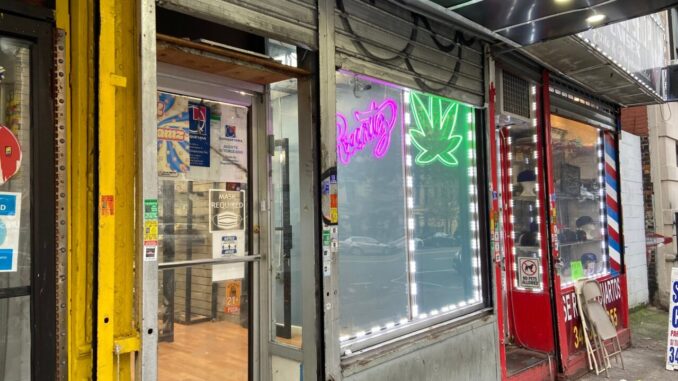
[ad_1]
A New York state lawmaker is proposing legislation that would give regulators the authority to revoke the liquor, lottery and tobacco retailer licenses from stores that sell weed without a license. If passed, the legislation would go into effect immediately, giving officials new tools to combat the illicit pot shops that have proliferated since the state legalized adult-use cannabis in 2021.
Democratic Assemblyman John Zaccaro Jr., a Democratic legislator from the Bronx, is the lead sponsor of the legislation in the New York State Assembly. The measure (A09520) has already attracted 70 co-sponsors in the chamber after being introduced late last month. A companion bill in the Senate (S08847), sponsored by Democratic Senator Jamaal T. Bailey, has 10 co-sponsors.
The legislation “Provides for the revocation of licenses to sell cigarettes, tobacco products, alcohol and lottery tickets for the possession or sale of illicit cannabis in violation of the cannabis law,” according to the text of the measure. Businesses caught selling cannabis without a license would be subject to losing their licenses for one year on the first offense. A second offense within three years would subject the businesses to license revocation for three years and a third violation would result in the loss of cigarette, liquor and lottery retailer licenses for five years.
Thousands of Unlicensed Pot Shops in New York City
The legislation was introduced as the state, particularly New York City, continues to deal with thousands of retailers selling cannabis without a license. The office of New York Mayor Eric Adams recently reported that approximately 2,500 unlicensed weed retailers were operating in the city. Meanwhile, a slow rollout of licensed cannabis retailers has seen only about 40 regulated pot shops open in the city since the first began serving customers in the closing days of 2022.
Zaccaro said that the unlicensed shops are “choking” the regulated cannabis market as it struggles to get on its feet. Most of the retailers selling weed without a license are smoke shops and bodegas, businesses that would be severely impacted by the loss of the revenue streams provided by cigarettes, alcohol and lottery tickets.
“We need to be able to go back to our districts and be able to let our constituents and people know that we took this issue seriously,” Zaccaro told the New York Daily News on Wednesday The lawmaker added that he hopes the legislation will pass quickly, either as a stand-alone bill or as part ongoing negotiations for the state budget, which have already exceeded a deadline of April 1.
State and city regulators have already made several attempts to combat the proliferation of unlicensed weed shops with little lasting success. In the New York City Council, local lawmakers are supporting a plan to shut down unlicensed pot shops under a decades-old nuisance abatement law that allows the city to close some businesses, such as brothels. Despite having 26 sponsors on the 51-seat council, however, the plan has not had a hearing.
While Zaccaro’s bill to revoke cigarette, liquor and lottery licenses from shops that sell marijuana without a license gives state and local officials new tools to combat the illicit operators, putting them to use is another matter. Cannabis attorney Fatima Afia said that state regulators at the state Office of Cannabis Management (OCM) will have to commit significant resources to enforcement for the legislation to be effective.
“I imagine that it would require a lot of resources, a lot of time, a lot of energy — basically all the things that OCM has clearly not had for purposes of enforcement up until now,” Afia said, adding that the slow rollout of regulated cannabis retailers is exacerbating the problem.
“The biggest supporter of the illicit shops is the fact that we don’t have enough licensed entities out there to compete with them,” said Afia.
Zaccaro’s bill has been referred to the Assembly Economic Development Committee, while the Senate version is under consideration by the chamber’s Budget and Revenue Committee.
[ad_2]
Source link

Soyez le premier à commenter